While the late Queen Elizabeth II famously described 1992 as her “annus horribilis”, for Ciara Lynch Burke, that honour goes to 2010.
“My marriage broke down, my business had to close and I opened here. And it was like the worst and the best thing I ever did,” she states, matter of fact.
“[But] nobody wants to listen to a moaner. You just have to get on.”
And that “roll up your sleeves” attitude has served Ciara well as she has turned her family farmyard into Sage & Stone: an award-winning courtyard café, farm shop, gift gallery and takeaway just outside Duleek in Co Meath.
Having grown up on a dairy farm in the 1980s, Ciara credits her parents, Shaun and Liz, for helping her develop her resilient streak.
“They were hit in the ‘80s with massive interest rates and they survived it and I think if you have grown up with that survival instinct, that you will get over this, I think you’ll get through everything,” she says.
Australia to Duleek
The background story of the farm itself is interesting. Ciara explains that her grandfather had actually emigrated from a small farm in Wicklow to Australia in the early 1900s, where he worked as a labourer cutting sugar cane, sheep shearing and finally, with the War Commission.
“Because he was working on the war effort, he was allowed to apply for a parcel of land in northern Queensland, which he cleared and made into his own cane farm,” she says.
He had actually been planning to move to Melbourne to buy a peach farm, but on a trip home to Ireland, fell ill, and never returned. That twist of fate saw the family settle in Duleek in 1952, with Ciara’s father inheriting the dairy farm in 1961.
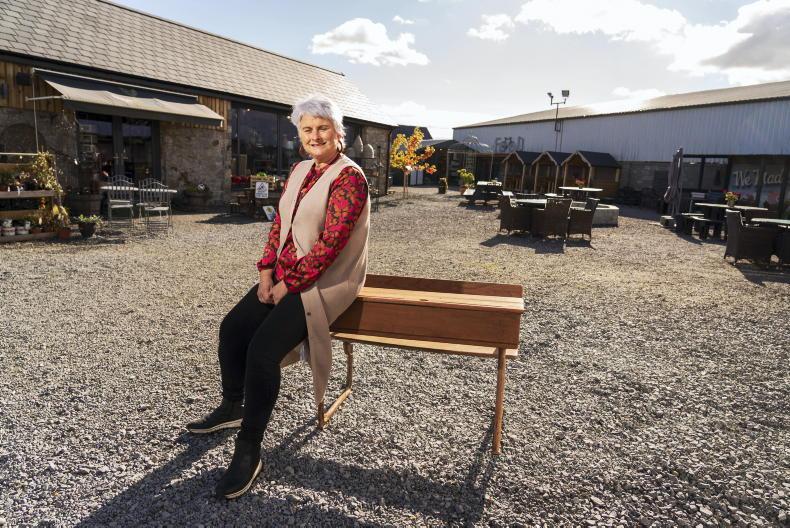
Ciara Lynch Burke. pictured at Sage and Stone farm cafe in Duleek. \ Barry Cronin
Shaun would have been well-known in Irish farming circles, as a breeder of one of the first Holstein Friesian dairy herds in Ireland, as well as various roles from county councillor to chairman of the Drogheda milk producers, supplying Drogheda and Dundalk dairies. Her mother, Liz, was also an entrepreneur, making ice cream from excess milk to sell at the dairy show and at another stage, encouraging Ciara to grow daffodils to pay for her Gaeltacht fees while in school.
Sadly, life changed when Shaun had to retire from farming on health grounds.
“He got Parkinson’s disease and then he had a liver transplant so he literally was not able for physical work anymore,” says Ciara, who remembers the heartache of the decision to lease out the farm.
“We saw all the cows going out of here, it was a very sad day; so the yard then was kind of lying idle.”
Coming home
At that stage, Ciara was forging her own career path. Having studied marketing with languages, she worked abroad in Australia, Paris and London in everything from restaurants to interior design, before starting a kitchen and homewear shop with her sister in Navan in 1998.
While the Celtic Tiger roared, however, rents soared.
“It was 90 grand; we weren’t on Fifth Avenue!” she says, adding that around 2009, her father first mooted the idea of her re-locating to the farm.
“I didn’t have this idea that this would be offered to me. And dad said, ‘Well, why don’t you do something in the yard?’ And I said, ‘Really?’” she recalls.
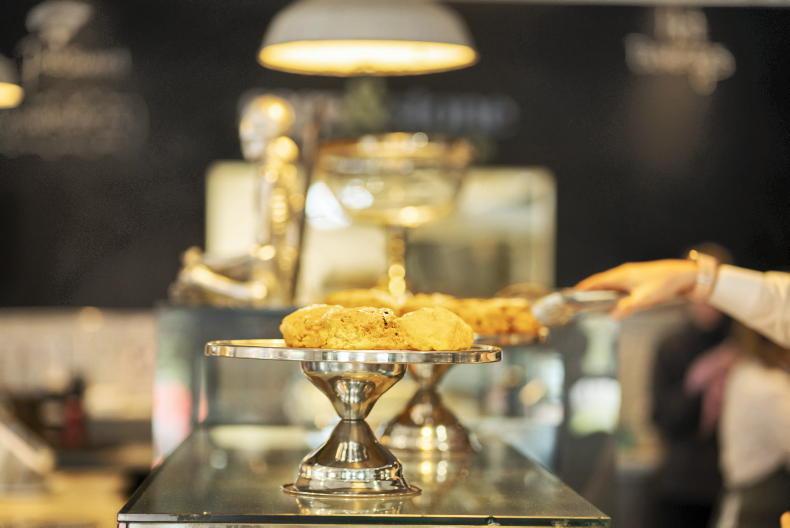
The popular cafe is open seven days a week. \ Barry Cronin
The end of Ciara’s marriage in 2010, however, was the motivation to take the leap of faith and move with her four daughters back home. Originally, the plan was to convert an old shed and run an online kitchen gadget shop; until another plan presented itself, almost accidently.
“People were coming over to see us and we were giving them teas and coffees and I was like, ‘Why are we giving them teas and coffees for nothing? Why don’t we just open a little tea room?” she explains.
“I was doing cafetieres of coffee and we were making scones. And then a friend of mine said, ‘Ciara, I think we have a coffee machine in the shed, do you want it? So I gave them a few cases of wine for it; and that’s how it got started.”
Challenging times
Not that it was plain sailing. As Ciara had bills to pay after closing her previous business (which she subsequently re-paid), she struggled to get finance from the bank. Fortunately, her parents were able to help her with loans to develop as she found her feet, but there were still hard times along the way.
“I remember one night I said, ‘We are going to have story time by candlelight girls, this is going to be so exciting,’ because my electricity had been cut off and I didn’t have the money to put it back on,” she recalls.
“You have to be the strong one and say, ‘Right guys, we can get through this’; and my kids are so strong as a result.”

Ciara Lynch Burke believes she owes her resilience to her farming background. \ Barry Cronin
Over the last 10 years, therefore, Sage & Stone has evolved almost organically as Ciara re-invested in converting the remainder of the farm buildings. Today it boasts a café with indoor and outdoor seating for 120 people- named best café in Co Meath at the most recent Irish Restaurant awards- as well as a gift gallery, a farm shop and takeaway, employing 32 full-time and eight part-time staff.
“I had a vision of what this place was going to be like and year by year, it’s getting there,” says Ciara; though sadly, her father passed away in 2018 when the business was not yet fully developed.
She is grateful, however, for the support of her mother, her partner Mick and daughters Millie, Jane, Tess and Meg, especially as the food industry continues to face challenges such as rising energy prices, with her bills shooting up by 30%. To help counter costs, she is currently awaiting SEAI approval to install solar panels and is hoping to get funding from LEADER in 2023 towards an aerobic digester to deal with food waste.
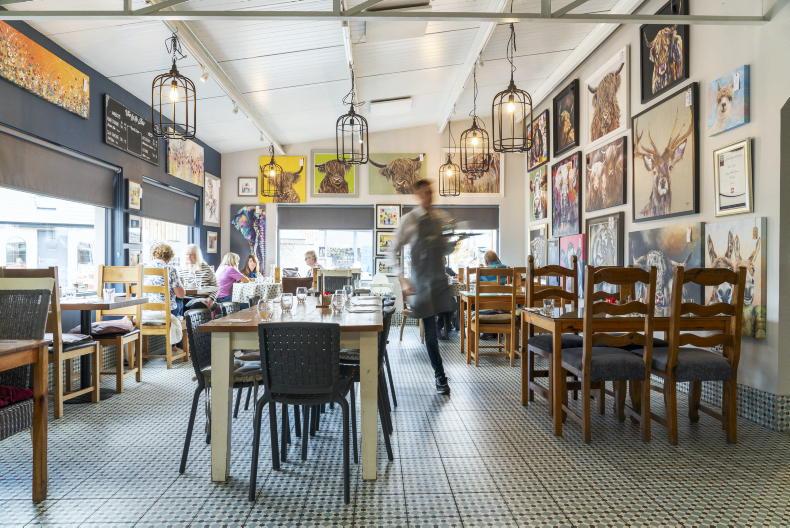
Sage and Stone employs 32 full-time and eight part-time staff. \ Barry Cronin
Her advice to anybody thinking of setting up a farm-based café or business is to consider practicalities like access (“a good car park is worth its weight in gold!”). She also advises against huge capital investment at the start and to make use of what you already have.
“If you have an old bench or if you have an old tractor chair, make it into something,” she says, “don’t spend a fortune making it all look new because people love the quirkiness of seeing something new every time they come in.”
Though she jokes that if anyone knew all that would be involved in setting up a new business, “you’d never start in the first place”.
But?
“I’m an optimist at heart!”
Visit www.sageandstone.com
Read more
Shining a light for rural entrepreneurship at Solas
Finding a passion for cheese-making in the Lost Valley
While the late Queen Elizabeth II famously described 1992 as her “annus horribilis”, for Ciara Lynch Burke, that honour goes to 2010.
“My marriage broke down, my business had to close and I opened here. And it was like the worst and the best thing I ever did,” she states, matter of fact.
“[But] nobody wants to listen to a moaner. You just have to get on.”
And that “roll up your sleeves” attitude has served Ciara well as she has turned her family farmyard into Sage & Stone: an award-winning courtyard café, farm shop, gift gallery and takeaway just outside Duleek in Co Meath.
Having grown up on a dairy farm in the 1980s, Ciara credits her parents, Shaun and Liz, for helping her develop her resilient streak.
“They were hit in the ‘80s with massive interest rates and they survived it and I think if you have grown up with that survival instinct, that you will get over this, I think you’ll get through everything,” she says.
Australia to Duleek
The background story of the farm itself is interesting. Ciara explains that her grandfather had actually emigrated from a small farm in Wicklow to Australia in the early 1900s, where he worked as a labourer cutting sugar cane, sheep shearing and finally, with the War Commission.
“Because he was working on the war effort, he was allowed to apply for a parcel of land in northern Queensland, which he cleared and made into his own cane farm,” she says.
He had actually been planning to move to Melbourne to buy a peach farm, but on a trip home to Ireland, fell ill, and never returned. That twist of fate saw the family settle in Duleek in 1952, with Ciara’s father inheriting the dairy farm in 1961.

Ciara Lynch Burke. pictured at Sage and Stone farm cafe in Duleek. \ Barry Cronin
Shaun would have been well-known in Irish farming circles, as a breeder of one of the first Holstein Friesian dairy herds in Ireland, as well as various roles from county councillor to chairman of the Drogheda milk producers, supplying Drogheda and Dundalk dairies. Her mother, Liz, was also an entrepreneur, making ice cream from excess milk to sell at the dairy show and at another stage, encouraging Ciara to grow daffodils to pay for her Gaeltacht fees while in school.
Sadly, life changed when Shaun had to retire from farming on health grounds.
“He got Parkinson’s disease and then he had a liver transplant so he literally was not able for physical work anymore,” says Ciara, who remembers the heartache of the decision to lease out the farm.
“We saw all the cows going out of here, it was a very sad day; so the yard then was kind of lying idle.”
Coming home
At that stage, Ciara was forging her own career path. Having studied marketing with languages, she worked abroad in Australia, Paris and London in everything from restaurants to interior design, before starting a kitchen and homewear shop with her sister in Navan in 1998.
While the Celtic Tiger roared, however, rents soared.
“It was 90 grand; we weren’t on Fifth Avenue!” she says, adding that around 2009, her father first mooted the idea of her re-locating to the farm.
“I didn’t have this idea that this would be offered to me. And dad said, ‘Well, why don’t you do something in the yard?’ And I said, ‘Really?’” she recalls.

The popular cafe is open seven days a week. \ Barry Cronin
The end of Ciara’s marriage in 2010, however, was the motivation to take the leap of faith and move with her four daughters back home. Originally, the plan was to convert an old shed and run an online kitchen gadget shop; until another plan presented itself, almost accidently.
“People were coming over to see us and we were giving them teas and coffees and I was like, ‘Why are we giving them teas and coffees for nothing? Why don’t we just open a little tea room?” she explains.
“I was doing cafetieres of coffee and we were making scones. And then a friend of mine said, ‘Ciara, I think we have a coffee machine in the shed, do you want it? So I gave them a few cases of wine for it; and that’s how it got started.”
Challenging times
Not that it was plain sailing. As Ciara had bills to pay after closing her previous business (which she subsequently re-paid), she struggled to get finance from the bank. Fortunately, her parents were able to help her with loans to develop as she found her feet, but there were still hard times along the way.
“I remember one night I said, ‘We are going to have story time by candlelight girls, this is going to be so exciting,’ because my electricity had been cut off and I didn’t have the money to put it back on,” she recalls.
“You have to be the strong one and say, ‘Right guys, we can get through this’; and my kids are so strong as a result.”

Ciara Lynch Burke believes she owes her resilience to her farming background. \ Barry Cronin
Over the last 10 years, therefore, Sage & Stone has evolved almost organically as Ciara re-invested in converting the remainder of the farm buildings. Today it boasts a café with indoor and outdoor seating for 120 people- named best café in Co Meath at the most recent Irish Restaurant awards- as well as a gift gallery, a farm shop and takeaway, employing 32 full-time and eight part-time staff.
“I had a vision of what this place was going to be like and year by year, it’s getting there,” says Ciara; though sadly, her father passed away in 2018 when the business was not yet fully developed.
She is grateful, however, for the support of her mother, her partner Mick and daughters Millie, Jane, Tess and Meg, especially as the food industry continues to face challenges such as rising energy prices, with her bills shooting up by 30%. To help counter costs, she is currently awaiting SEAI approval to install solar panels and is hoping to get funding from LEADER in 2023 towards an aerobic digester to deal with food waste.

Sage and Stone employs 32 full-time and eight part-time staff. \ Barry Cronin
Her advice to anybody thinking of setting up a farm-based café or business is to consider practicalities like access (“a good car park is worth its weight in gold!”). She also advises against huge capital investment at the start and to make use of what you already have.
“If you have an old bench or if you have an old tractor chair, make it into something,” she says, “don’t spend a fortune making it all look new because people love the quirkiness of seeing something new every time they come in.”
Though she jokes that if anyone knew all that would be involved in setting up a new business, “you’d never start in the first place”.
But?
“I’m an optimist at heart!”
Visit www.sageandstone.com
Read more
Shining a light for rural entrepreneurship at Solas
Finding a passion for cheese-making in the Lost Valley








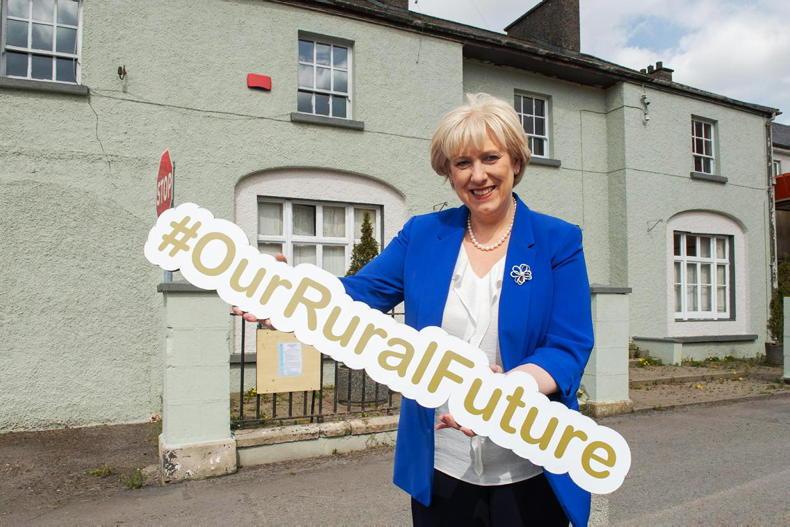
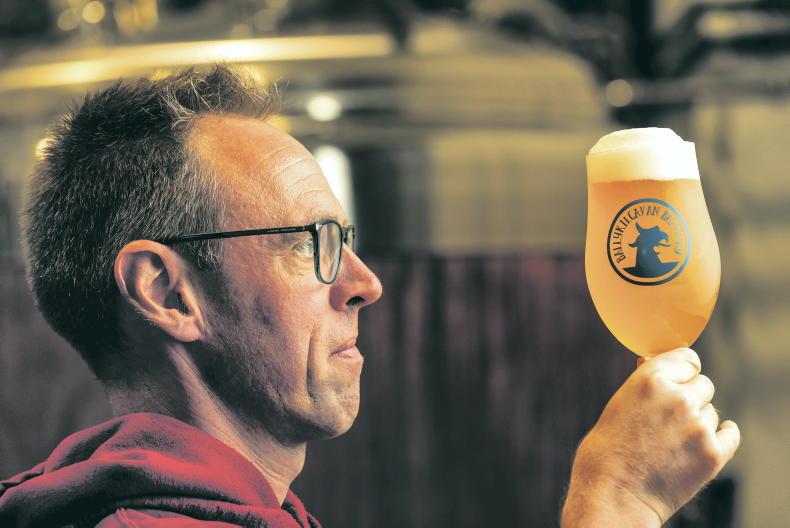
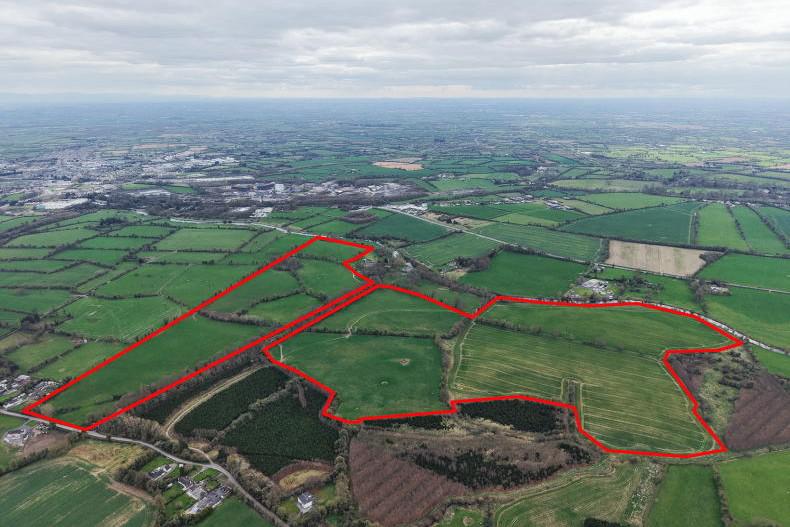
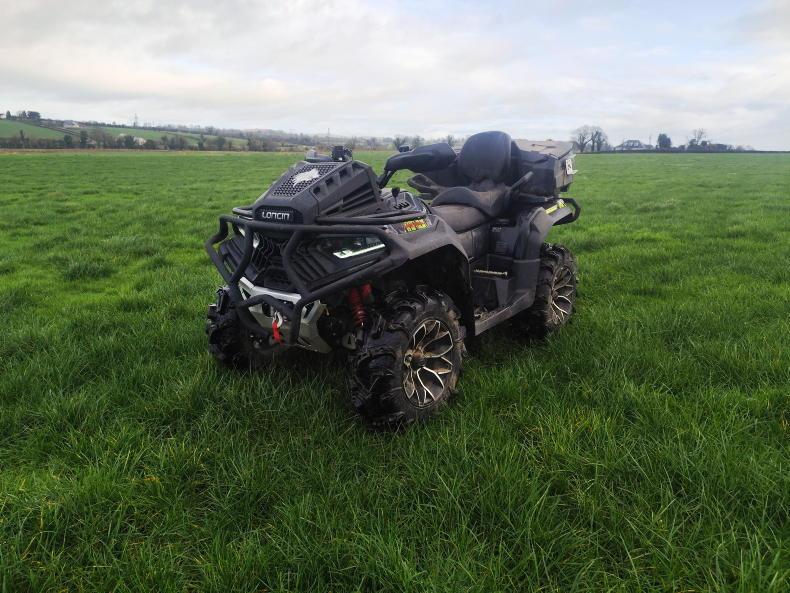
SHARING OPTIONS